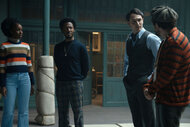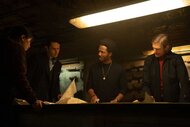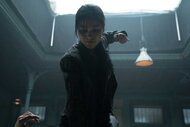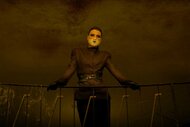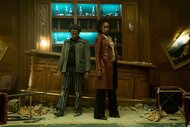From Needle Drops to Background Beats: How Sound Helped Build the 1970s World of The Continental
All three episodes of The Continental are now streaming exclusively on Peacock.
Spoiler warning! The following contains major plot spoilers for The Continental: From the World of John Wick!
While technically designated as a television series from the moment it was first announced, The Continental: From the World of John Wick (all episodes are now streaming on Peacock) always had the scope, ambition, and challenges of "three action movies tied together," the project's Re-Recording Mixer Joe Barnett tells NBC Insider over Zoom.
"Building the world was huge," echoes Supervising Sound Editor Luke Gibelon, recalling how series director and executive producer Albert Hughes (From Hell, The Book of Eli) wanted the hotly-anticipated John Wick prequel "to be an experience" like no other. "And in order to do that, we had to create this very immersive, environmental space of sound [and] of storytelling."
Building the "sonic palette" of the John Wick universe
Gibelon, who has been a part of the franchise since its inception back in 2014, had the advantage of an existing sound library that he and his team have built and cultivated for close to a decade. "Without having worked in the world of John Wick — and having that fluency when it comes to world-building for John Wick in the action for John Wick — there's no way we would have been able to achieve all these other things that we've done with Albert's vision," he confesses.
RELATED: The Ending of The Continental Explained
Barnett's job was to then take that "sonic palette" and mold it to the narrative requirements of the story being told onscreen. Despite the fact that the John Wick movies have built a multi-billion dollar empire through over-the-top action set pieces, the folks behind each project never want to inundate viewers with too much of a good thing.
"You can't just play everything up all the time. Then it just gets boring," Barnett explains. "You’ve got to build in the dynamics, the peaks and valleys. If you have a loud sound next to a loud sound, then it’s not really that loud. But if you have a loud sound and then something super quiet and then another loud sound... BOOM! It really pops. We're always playing with those dynamics in order to tell the story effectively. So the audience gets the Oh-Factor from a big explosion or a gun battle, but it's not fatiguing."
One way to keep things interesting is by making sure that "every gunshot" sounds unique, "even if it's a single gun," Gibelon reveals. "We're doing all of these things to create this very hyperreal action that still feels natural." Another challenge is finding the proper balance between violence and comedy, a great example of which can be found in the finale when Yen (Nhung Kate) blows up Gretel (Marina Mazepa) after their intense battle atop the hotel roof.
"We are supposed to both be grossed out and laugh at the same time," notes Barnett, remembering that there was a lot of back and forth on how Gretel's viscera would rain down — both visually and sonically. "We were messing around with the sync placement of each of those pieces multiple times."
Capturing the sound of 1970s New York for The Continental
Taking place about 40 years before Mr. Wick's quest of revenge — and subsequent journey to free himself from the control of High Table — the limited spinoff explores how Winston Scott (Colin Woodell playing a younger version of the character made famous by Ian McShane) became manager of the titular hotel in late-1970s New York City.
"We were peppering things in all the time like little period TV commercials and radio jingles and promos," Barnett says of channeling the pre-digital backdrop. "It was something they were very aware of from the beginning."
"It’s just being mindful of what time we're in," Gibelon agrees, going on to add that while vehicles and general urban ambience had to accurately reflect the time period, a lot of the heavy sonic lifting had already been done by the movies. "We’ve already created a bit of a timeless aspect of it ... there's already a lot of analog elements that are mixed in with modern elements. That's in a great effort to make this feel like we're almost in a suspended time."
RELATED: The Continental: From the World of John Wick Director Breaks Down Finale's Most Creative Fight Scene
And just like the films, The Continental was free to flirt with the technologically advanced/slightly sci-fi elements of the clandestine criminal underworld. A prime example can be found in Night 3 when '70s-era manager Cormac O'Connor (Mel Gibson) seeks refuge in the secret Operations Room on the 13th floor.
"We're in a secret room and it’s basically futuristic equipment that you would see in a ‘70s show," Gibelon continues. "It was the fun aspect of going, ‘Okay, if we're watching a film from the ‘70s that was sci-fi, where can we then throw in some fun, sci-fi elements that they would have done?’" Cormac's underground escape pod follows that same principle: "A sci-fi vehicle for that time period with fun hydraulic pieces, a chime of its own, and moody train chuff breath as it sat idle."
"The Continental is a building of contradictions," Barnett adds. "It’s essentially a bank vault — or a prison depending how you look at it — and sonically, it was represented that way. But it’s a whimsical place as well with its secret passages and kooky cast of resident miscreants."
1970s needle drops in John Wick prequel The Continental
Licensed songs are a staple of nearly every period piece out there, and The Continental is no exception. The soundtrack is packed to the brim with classics by James Brown, Three Dog Night, Santana, Dr. John, The Who, Heart, Ace Frehley, Donna Summer, Harry Nilsson, Yes, Tommy James & the Shondells, Pink Floyd, Gerry Rafferty, ZZ Top, and more.
"Albert had very, very specific ideas about how music should be played," Barnett says. "He would always talk about a period needle drop, so we’d play it big. But he would be like, ‘That’s kind of half-ass, we need it to be full-ass!’"
He continues: "Albert uses music as a sound effect in the sense that there's lots of manipulations of the music. It might start full and then go to a car radio and then be coming out of a speaker in someone else's car. All of those kinds of manipulations that you have to be careful with or else it sounds gimmicky. Albert was ‘full-ass’ all the way on this and it works, because the music really does set the tone of the period."
RELATED: The Continental Director Reveals His Other Idea for Potential John Wick Spinoff
Gibelon builds on that sentiment, stating that rather than have needle drops dominate specific scenes, Hughes requested an organic interplay between music and sound design. In Night 1, for instance, play close attention to how the diegetic noises are used as a compliment to Santana's "Jingo" while Frankie heads underground to enact his coin press heist. "A Salvation Army lady is ringing a bell in time with the music," Gibelon explains, "and then the subway horn grows with the organ."
Something similar occurs in Night 3 with Three Dog Night's "One is the Loneliest Number" as Cormac heads to the 13th floor. "We're making this mechanical movement of the elevator in rhythm with the electronic keyboards and then taking the sound of air moving through these pipes and creating a false rise with the phrase of the music. And then another finishing rise as he opens the door and the next part of the phrase of the music ends."
Barnett concludes that "comedic" and offbeat choices like "Chicken Strut" (The Meters) and "Popcorn" (Hot Butter) play "against type as the ultra-violence ensues. This dextrous fluidity of style really shows the creative hand of Albert navigating the emotional peaks and valleys, absolutely forbidding the viewer to get tired or bored."
How to watch The Continental: From the World of John Wick?
All three episodes of The Continental: From the World of John Wick are now streaming exclusively on Peacock. John Wick Chapters 1-3 are also available on the service.
The platform currently offers two monthly subscription plans: Premium ($5.99 a month with ads) and Premium Plus ($11.99 a month with no ads and download access for certain titles). If you're currently a student, you can enjoy the Premium plan for just $1.99 for an entire year.


























